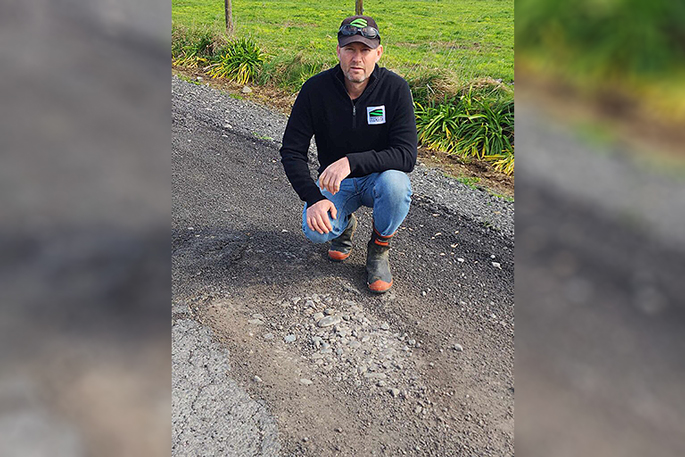For rural communities struggling with pothole-riddled roads, run-down bridges and never-ending slips, their challenge to the new Government is ‘show us the money’.
“Farmers recognise the Government have a huge amount of work on their plate, and keeping a lid on taxes means there’s only so much money to go around,” Federated Farmers national board member and transport spokesman Mark Hooper says.
“While we are supportive of the ‘Roads of National Significance’ programme, there is some concern in rural areas that there won’t be enough funding available for provincial state highways and local road renewal and maintenance.”
For the agriculture and horticulture sector, those rural highways, local roads and bridges are critical to getting product to processors and markets in a timely manner, Hooper says.
“In the absence of the public transport options available in most urban areas, they’re also the access lifelines for farming families getting to schools, suppliers and other services.”
Federated Farmers Wairarapa president David Hayes says for farmers in his home district of Masterton, rates bills of $10,000-plus a year are common and roading costs are easily the biggest component.
“I’d suggest that would be the same for many provinces in New Zealand,” he says.
While the previous Government stepped in with a large proportion of funding for the $27m of damage caused to Masterton’s roads by storms in June/July 2022, and the cyclones earlier this year, the local share of road renewal and maintenance costs continues to rise.
Masterton District Council’s Infrastructure Committee chair David Holmes, a farmer himself, says most of the area’s rural roading network was built to cater for trucks of 20-30 tonnes.
“Now we’re getting trucks of 50 tonnes or more.”
Although the council is investigating higher targeted rates for forestry operators, Holmes says the local government funding model for roads and three waters infrastructure “is broken”.
During election campaigning, National’s transport spokesperson Simeon Brown – now the new Minister for both Transport and Local Government – pledged his party would establish a $500 million Pothole Repair Fund to “urgently address the shocking state of our local roads and state highways”.
There’s no mention of that fund in National’s coalition agreements with ACT and NZ First.
The agreement with NZ First mentions 13 new Roads of National Significance and four major public transport upgrades.
There’s also a commitment to building a four-lane highway alternative for Northland’s Brynderwyns and to investigate the use of private finance to accelerate construction.
ACT has agreed to National’s plans for a network of 10,000 public EV chargers by 2030 but insisted this be subject to “a robust cost-benefit analysis”.
Labour’s speed limit reductions – a bone of contention in many provincial areas – will be reversed where it is safe to do so.
And in another clue on how the new Government hopes to foot transport bills, ACT and National have agreed to “institute long-term city and regional infrastructure deals, allowing PPPs (public private partnerships), tolling and value capture rating to fund infrastructure”.
Instructions to NZTA/Waka Kotahi on government priorities come in the form of the three-yearly Government Policy Statement (GPS) on Land Transport.
In a move welcomed by Federated Farmers, the Labour Government’s draft GPS, put out in April this year, made highway and local road maintenance a ‘strategic priority’, and significantly bumped up funding for it.
But even with that Federated Farmers questioned whether it would be enough to catch up on years of under-investment, particularly with the cyclones at the start of this year having absolutely pounded rural infrastructure.
“Our sector, like others that rely on good transport access, are in ‘wait and see mode’ for the new Government’s GPS,” Mark Hooper says.
“We’re cautiously optimistic. At our National Conference meeting in Wellington on November 29, Trade and Agriculture Minister Todd McClay made it clear the Government knew that farmers and growers are vital to the national economy.
“Simeon Brown has talked about instructing Waka Kotahi to lift rehabilitation work to at least 2% of the roading network each year – more than double the current rate.
“Federated Farmers is pleased there appears to be recognition that looking after the roads we already have, particularly the networks crucial to getting domestic and export goods to ports and markets, is just as important as building new roads,” Hooper says.



0 comments
Leave a Comment
You must be logged in to make a comment.